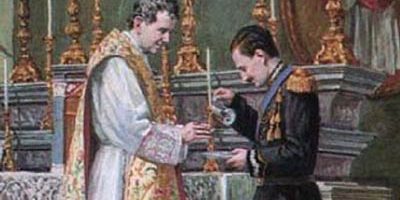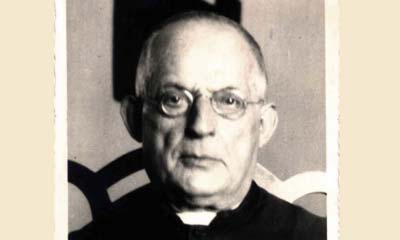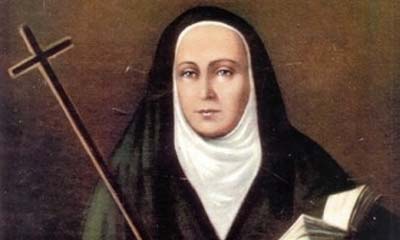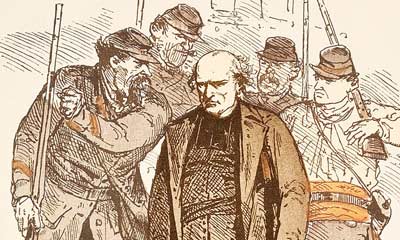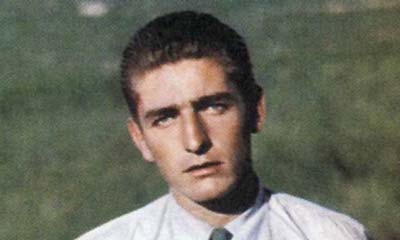June 19, 2024
Blessed Francesco Faà di Bruno
Dear Friends,
One day in the middle of the 19th century, Professor Francesco Faà di Bruno was presenting a complex demonstration from his chair of mathematics at the University of Turin, when the tinkle of a bell announced the passage of the Holy Viaticum (the consecrated Host) which a priest was carrying to a dying person. Without a trace of human respect, the professor descended from his pulpit and knelt down by the window. The students, transfixed with admiration, ended up kneeling as well. So, who was this professor become priest, beatified by Pope John Paul II on September 25, 1988?
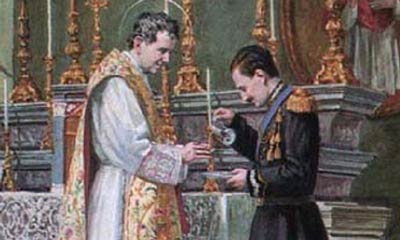 Francesco Faà di Bruno was born in Alessandria (Piedmont, Italy) on March 25, 1825, the twelfth and last child of Marquis Luigi Faà di Bruno and his wife, Carolina Sappa. His family was of very ancient nobility, and lived close to Don Bosco’s native farm; however, the two families, with their very different social backgrounds, did not socialize. He lived in a happy and harmonious family environment, where piety and the arts reigned supreme. From an early age, the children helped to distribute alms to the poor. Francesco, a sickly child, was entrusted to the care of his paternal grandfather, and spent his early childhood at the castle of the Bruno family, where he thrived from life in the open air. In 1834, his mother died of illness and exhaustion. Not long before her decease, she had confided to her husband: “It is not so very difficult to be good: it only takes love to do good.” Shortly afterwards, François also lost his grandfather.
Francesco Faà di Bruno was born in Alessandria (Piedmont, Italy) on March 25, 1825, the twelfth and last child of Marquis Luigi Faà di Bruno and his wife, Carolina Sappa. His family was of very ancient nobility, and lived close to Don Bosco’s native farm; however, the two families, with their very different social backgrounds, did not socialize. He lived in a happy and harmonious family environment, where piety and the arts reigned supreme. From an early age, the children helped to distribute alms to the poor. Francesco, a sickly child, was entrusted to the care of his paternal grandfather, and spent his early childhood at the castle of the Bruno family, where he thrived from life in the open air. In 1834, his mother died of illness and exhaustion. Not long before her decease, she had confided to her husband: “It is not so very difficult to be good: it only takes love to do good.” Shortly afterwards, François also lost his grandfather.
In June 1840, Francesco, who was fifteen years old and had completed his classical education,was hesitating between the religious life and a military career. In his own family, he already had four examples of lives dedicated to God: one of his brothers, Carlo Maria, was a Friar in the Order of the Pious Schools, and another, Giuseppe, was a Pallottine Father; his sisters Enrica and Camilla had respectively entered the Order of the Visitation and the Sisters of the Sacred Heart. Francesco opted for a military career, feeling that he could leave later, should he want to dedicate himself to God. At the Military Academy in Turin, he stood out for his discipline and academic achievements. He was appointed lieutenant of the Royal General Staff in August 1846. It was a time when many soldiers were involved in the national uprising against the Austrian occupation. In 1848, during the First War of Independence, Francesco served by the side of Charles Albert (King of Piedmont-Sardinia), in a company under the command of Duke Victor Emmanuel, and became the latter’s aide-de-camp. When his division was about to receive the baptism of fire, Francesco wrote to his sister Maria Luigia, urging her also to pray for his comrades-in-arms. He feared that “at such a crucial moment, they would die without purification and comfort for their souls, because of the continued neglect of the divine things with which they had clothed themselves in times of peace and of which they could not divest themselves in times of war.” Constantly striving himself to live in a state of grace (without serious sin), he was deeply concerned for those who had no such care. Following two lost battles at Custoza and Novara, where he had seen so many fall in the flower of youth, he was especially conscious of the final destiny of many of his companions and friends.
Eternal salvation should be every man’s main concern. Saving one’s soul means obtaining a share in God’s life in heaven for all eternity: “God, infinitely perfect and blessed in himself, in a plan of sheer goodness freely created man to make him share in his own blessed life” (Compendium of the Catechism of the Catholic Church, no. 1). At the moment of death, each person is subjected to a first judgement by Christ, called the “particular” judgment: “It is the judgment of immediate retribution which each one after death will receive from God in his immortal soul in accord with his faith and his works. This retribution consists in entrance into the happiness of heaven, immediately or after an appropriate purification, or entry into the eternal damnation of hell” (ibid., no. 208). At the end of the world, a second judgment will take place, of which the Compendium of the Catechism tells us: “The final or universal judgment consists in a sentence of happiness or eternal condemnation, which the Lord Jesus will issue in regard to the just and the unjust (Acts 24:15) when he returns as the Judge of the living and the dead. After the last judgment, the resurrected body will share in the retribution which the soul received at the particular judgment” (no. 214). Since heaven and hell are eternal, it is of the utmost importance to gain the one and avoid the other. “Command that we be delivered from eternal damnation and counted among the flock of those you have chosen,” the Church asks on our behalf in the Roman Canon (Eucharistic Prayer I).
At the end of 1849, Victor Emmanuel II, who had become King following the abdication of his father Charles Albert, appointed Francesco “mathematics tutor to the royal princes.” In order to help him perfect his mathematical skills, the King sent him to Paris. There Francesco obtained a degree in mathematics on March 10, 1851, and attended the ardent parish of Saint-Sulpice. Father Armand de Pontlevoy, a Jesuit, became his spiritual director, and Francesco followed the Exercises of St Ignatius. He became involved in the Conferences of St Vincent de Paul and met Blessed Frédéric Ozanam. At the Sorbonne, he became close friends with Augustin-Louis Cauchy, a well-known mathematician and devout Catholic, who would become his model for life.
Being Useful to Others
Back in Turin, the anti-clericals had managed to obtain the revocation of his appointment as tutor to the king’s children, as he realized when he was assigned other duties. He wrote to his brother Alessandro: “I feel out of place… Educating myself and being useful to others are the hinges of the door to my own happiness” (June 23, 1852). On one occasion, when Francesco was with a group of officers, he was singled out by one of them, and publicly insulted. His companions pressed him to challenge the officer to a duel, but he kept his cool and evaded the provocation. In view of the difficulties he encountered in the army, and well aware that his refusal to become a Freemason was obstructing his military career, he handed in his resignation in March 1853 in order to devote himself entirely to his studies. At that time, he wrote a “Christian Soldier’s Handbook,” a collection of teachings and prayers specifically designed for soldiers; it was to have a wide circulation.
Francesco enjoyed a good relationship with Don Bosco. A disciple of Don Bosco, Don Giovanni Battista Francesia, later recalled: “In the early days of the oratory, almost every Monday, we would see an engineer captain (Francesco) arrive. Having laid down his sword, he would go to confession, serve Mass and receive Holy Communion. It edified us all.” Don Bosco, who had been caring for boys since his ordination to the priesthood in 1841, inspired Francesco to do the same for young girls from humble backgrounds, who were so often ignored. Francesco opened a school of sacred chant, similar to an oratory, for these girls. He had been musical since childhood and composed a collection of hymns, “La Lira Cattolica” (The Catholic Lyre), which would spread throughout the parishes of Piedmont. During this time, he spent many hours in prayer in the church of the Sisters of the Blessed Sacrament, which hosted perpetual adoration. “Pray, pray without ceasing,” he wrote, “everything depends on prayer!”
“My Only Concern”
In May 1854, he returned to Paris, where he obtained further degrees in mathematics and astronomy. In 1856, he invented a system of reading and writing for the blind for his sister Maria Luigia, who was losing her eyesight. It was a precursor to Braille and would prove useful to many, and was rewarded with several prizes. While in Paris during the Lent of 1856, one of his friends from Turin fell ill and subsequently died. Francis wrote to his sister: “This illness proved to be the most useful of Easter retreats for me… From now on, my only concern, if God sustains me, is to live as a saint and to deserve to have a similar death. Everything else is truly pointless and no more than child’s play.” That same year, he became a member of the Œuvre d’Orient, which had been founded on April 4, 1856 by lay professors at the Sorbonne. On returning to Turin at the end of the year, and following in the footsteps of what he had witnessed in Paris, he set up the “Economical Stoves,” shops where food was sold at very low prices for the benefit of workers and the poor in general. He also set up an association to promote rest on feast days, with St John Bosco as vice-president.
The difficulties encountered by the pupils at the school of sacred chant caused Francesco a great deal of anguish: some were left without work, without guidance, without support, and without a place to turn to if they were fired. His many connections often enabled him to find them work. In 1859, however, he bought a small house and a plot of land in the disreputable suburb of San Donato, where he set up “the work of St Zita” in order to take better care of them. “Among Francesco’s social initiatives,” said Pope John Paul II, “a special mention should be made of the work of St Zita for the social and spiritual advancement of women (domestic servants, unemployed women, apprentices, single mothers, the sick, the elderly): the Blessed encouraged the creation of a true ‘women’s town,’ with schools, workshops, infirmaries and boarding houses, all with their own rules.He lavished his family property, his earnings and his entire self on this courageous and prophetic initiative” (September 25, 1988). In order to provide free accommodation for the young girls and keep them occupied, he designed and built a model laundry on his land which was crossed by a canal, with machines he had invented himself. The women who stayed there formed an association that allowed them to remain in touch with the organization after they had left. The boarders had a strong spiritual life: a chapel welcomed them every morning for Holy Mass and a short meditation, in the afternoon for a visit to the Blessed Sacrament, and in the evening for prayers. Yet the founder was subjected to frequent slander and malicious innuendo. When he passed through the village, he was mocked as a “knight in rags.” He replied to those who complained of similar vexations: “Let the sparrows sing!” Twenty years after the charity was founded, over 10,000 young women had received assistance there. Francesco also took in humble young girls who were capable of working but who suffered from mental disabilities. Placed under the patronage of St Clare, they became known as the “Clarines.” The work rescued them from poverty, or even exploitation, and provided them with moral and religious support. In return, they took on many material tasks, particularly in the laundry.
In 1861, the University of Turin granted Francesco the title of associate professor, but he was never made an “ordinary” professor. He is nevertheless credited with designing or perfecting certain scientific instruments and, in mathematics, remains known for “Faà di Bruno’s formula.” He shared Don Bosco’s distress at the spread of immoral newspapers, and having been unsuccessful in founding a Catholic newspaper, he set up a lending library. In 1872, he set up another, traveling library, especially for priests. Francesco founded several retirement homes: one for wealthy women, with whom he regularly had lunch, speaking with the foreign ladies in their native language, as he knew French, English and German; one for elderly working women; and another for poor and elderly priests.
Decisive Influence
Francesco was keenly aware of the influence that a good mistress can exert on her pupils and on the environment in which she lives. He attached the utmost importance to training teachers who stood firm in the faith, rich in knowledge but also in virtue. In 1866-67, he therefore agreed to take over the management of a struggling women’s teacher training college. He recruited a team of excellent professors and taught the mathematics, physics, astronomy and ethics classes himself. He monitored the pupils individually, and made them realize that their very presence in a village could completely transform it. He also founded a charity for single mothers. It was entrusted to a lady of great discretion, who offered her generous sympathy to these girls who were rejected by many.
Francesco’s solicitude for women reflects the teaching of the Church. “In Christianity more than in any other religion,” remarked St Paul VI, “from the very beginning women have had a special status of dignity, many striking aspects of which are attested to in the New Testament” (December 6, 1976). In his letter Mulieris dignitatem, St John Paul II wrote: “The Church gives thanks for each and every woman… as they have come forth from the heart of God in all the beauty and richness of their femininity… as they assume, together with man, a common responsibility for the destiny of humanity according to the daily necessities and according to that definitive destiny which the human family has in God himself” (August 15, 1988, nos. 29, 31).
By 1863, Francesco had embarked on the construction of the church of Our Lady of Suffrage, a shrine dedicated to prayer for the fallen of all wars, for his charity extended to the souls in Purgatory. The Compendium recalls: “Purgatory is the state of those who die in God’s friendship, assured of their eternal salvation, but who still have need of purification to enter into the happiness of heaven. Because of the communion of saints, the faithful who are still pilgrims on earth are able to help the souls in purgatory by offering prayers in suffrage for them, especially the Eucharistic sacrifice. They also help them by almsgiving, indulgences, and works of penance” (nos. 210, 211). A highly original 75-meter-high bell tower, which Francesco had himself planned in every detail, was built next to the church, with as many bells as there are notes in the scale. A five-meter-high statue of St Michael the Archangel still crowns the structure.
Not Without Nuns
Many women volunteers helped Francesco with his work. Looking to the future, Francesco began thinking about founding a congregation of women religious. “Whoever aims for God, and whoever wishes to leave a legacy of good for all eternity, cannot act without nuns,” he wrote. The young Giovanna Gonella answered his call, followed by others who formed the nucleus of the Sisters of St Zita, also known as the Minim Sisters of Our Lady of Suffrage; they were to have a special devotion to Mary and provide assistance to the souls in Purgatory. The foundation took place in 1881. Its beginnings were austere, marked by hard work, much prayer and great poverty. Its Rule reflected the military spirit of its author, who was demanding but attracted by his love of God and his own example. His intense spiritual life earned him the nickname “the lay Carthusian.”
Francesco was responsible for many other initiatives, including the publication of a booklet on the Eucharist, the management of a periodical, the running of a museum on the Catholic Missions, a typography workshop, a class for teenage girls, a convalescent home for young working women recovering from hospitalization… But he gradually realized that the priesthood would enable him to be a better guide for souls; besides, could a religious congregation be run by a layman? After much thought and consultation, he approached the Archbishop of Turin, Monsignor Gastaldi, but the latter would only consider ordination after at least six months’ formation in a seminary. Francesco believed that a prolonged withdrawal from his works at that point would have irreparable consequences. Determined not to act against the wishes of his archbishop, he postponed the project until a later date, and then went to Rome for a time of retreat. Influential people there spoke about him to Pope Pius IX, who already knew him and had given him considerable financial assistance. The Holy Father was very understanding and decided to take responsibility for his ordination, which took place on October 22, 1876, and presented him with a beautiful chalice. Francesco was fifty-one. It took seven months to appease the archbishop after this affair; nevertheless, on the 31st of October, the prelate still proceeded to bless the church of Our Lady of Suffrage. Out of consideration, Don Francesco refrained from appearing during the ceremony; it was only on the following day, very early in the morning, that he celebrated a first Mass in the church. His devotion to the Eucharist became more intense, and on occasion he even spent long hours in the presence of the Divine Host during the night. Francesco, who had devoted himself to the Blessed Virgin since his youth, saw in the church of Our Lady of Suffrage a means to illustrate Mary’s role as mediatrix for the souls in Purgatory.
She Cannot Forget her Children
“Can the Virgin who was given as mother to all Christians by Jesus on Golgotha forget her children who have already left this earth, but who have not yet reached Heaven because they are not sufficiently pure from the stain of sin?,” he wrote. “Mary is the universal Mother; she cannot abandon her children when they need her help. She knows the torments to which these souls are subjected by divine justice. She knows their ardent sighs, which are inspired by love and the desire to attain the enjoyment of the love towards which their hearts irresistibly incline; she sees in these unhappy souls as many lovers of her and of Jesus… Precisely, Mary revealed to St Brigid (Book 4): ‘I am the Mother of all those who are in the prison of Purgatory.’ And a hundred true revelations show that the Virgin visits them, consoles them, intercedes for them and sometimes frees them all… Devotion to Our Lady of Suffrage serves to remind us that we will have to pay the price for the smallest of our faults, and that we must implore the Virgin Mary to help us avoid the sins, the omissions, the coldness which, so to speak, are so many woods of Purgatory; and at the same time to make us love penance and mortification, and fervor, which are the ways by which we can complete our purgatory on earth… Oh! How much confidence is awakened in our hearts by these reflections and how much love we can feel growing in Mary” (Treatise on the Heart of Mary).
In 1881, Francesco bought a castle in Benevello, near Alba, where he opened a house for the instruction and Christian formation of young girls aged between seven and fifteen.
On January 31, 1888, St John Bosco died. On hearing the news, Don Francesco exclaimed: “A saint has just died!” Two months later, on March 27, he himself surrendered his soul to God. In an act of consecration to the Sacred Heart of Jesus in agony in the Garden, he had written: “How shall I repay thee for such an excess of love? While I await the supreme moment of agony, I offer myself entirely to thee as a holocaust… O Heart of Jesus, I consecrate my body to thee, and accept all the sufferings that thou mayest wish to send me; I consecrate my soul to thee, and submit to all the forms of aridity, sadness and desolation through which I will have to pass.”
“Francesco Faà di Bruno is a herald of faith and charity,” said St John Paul II, and on September 2, 2002, in a message to the Minim Sisters of Our Lady of Suffrage, he remarked: “Impelled by the inner desire to cooperate in the salvation of his brethren, he was concerned with their final destiny. Man’s ultimate goal is the meeting with God, a meeting that one needs to prepare for from now on with a constant ascetical effort, rejecting evil and doing good… The first and highest form of love for our brothers and sisters is the burning desire for their eternal salvation.” Let us ask Blessed Francesco to help us practice this form of charity!


